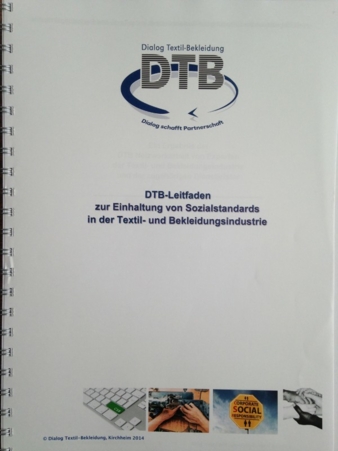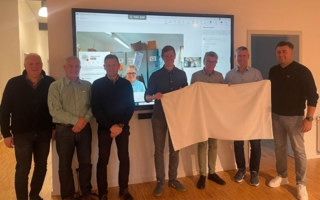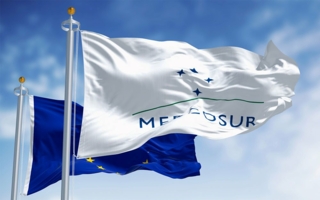05/02/2015 — auf Deutsch lesen
DTB: Working to raise awareness
DTBs new guidelines for compliance with social standards in the textiles and apparel industry could not be more relevant, and may have what it takes to become definitive reading within our sector. One thing is clear: corporate social responsibility (CSR) must be strategically managed beyond the moral approach in order to achieve sustainable change.
Ever since 2002, the DTB (Dialog Textil-Bekleidung) – and thus an alliance of 161 textiles and apparel companies in a separate working group – have been engaging with the issue of CSR in business culture, which is considerably longer than current public discourse may suggest. The issues which have been brought to national attention through the German federal government’s ‘Alliance for Sustainable Textiles’ – which, among other things, is concerned with working conditions in production countries – have, for many years, run like a golden thread through the DTB and their complex, CSR-related activities.
The newly published guidelines bring all of this together and outline methods which will allow companies to develop individual strategies using a process-based approach. 2011 marked the beginning of the project to create a set of application-oriented guidelines which would specifically illustrate CSR requirements: the intended goal was not (only) to illustrate the moral approach, but (also) the economic approach. For Peter Werminghaus, author of the study, and Managing Director of the BTI Gesellschaft für Beratung, Transfer, Innovation mbH, Mönchengladbach, CSR is “simply risk management.”
The reason for this conclusion are the fundamental changes in sourcing practices. If companies who manufacture in-house suddenly purchase 40 to 60 percent of their commodities from around the world, then they are in a high-risk sector without even realising. Before, German industry was able to operate comfortably within the homogenous legislative frameworks across Germany and Europe, but today it must constantly deal with differing regulations on working hours around the world as well as with national trade unions, such as those in China.
Further stumbling blocks include internal communications problems, such as between sales management and product managers. Werminghaus estimates the proportion of companies with any kind of strategic approach to CSR to be lower than 15 percent at present. Furthermore, a “critical factor” is that industry is primarily steered by external influences such as legislation or customer wishes. This, at least, was the conclusion of a survey of 202 decision makers from German companies conducted by the Allensbach Institute for Public Opinion Research. The CSR guidelines from the DTB, which existing initiatives and auditing groups also helped to create, are therefore not only a valuable handbook for the implementation of CSR strategies, but also a wake-up call.
The content provided in the brochure includes, among others, an overview of the governmental, semi-governmental and private players in the area of CSR, an overview of sourcing markets and their risks, the motivations for CSR, the definitions of the aims, auditing processes and communication. Project management procedures are explained and the guidelines also contain CSR training materials as well as specific practical examples.
For this year, the DTB and Setlog GmbH have planned training and seminars to ensure structured implementation of CSR measures. New thinking is the first step in the right direction. However, the following steps also need to be planned and taken carefully. Ultimately, CSR management is also a cost factor. The magic word is therefore ‘cost efficiency’! The training provided aims to show how CSR can be managed in a cost-effective way. More information can be found directly from the DTB at
[Iris Schlomski, Regine Hövelman]
… there were companies within the textiles and apparel industry who were involved with the issues of safety and workplace conditions in production facilities. However, the disaster showed that there were still considerable shortcomings in the entire supply chain, and that not all companies involved were engaging with the issue of CSR. CSR has been an area of conflict and has been polarising at all levels in terms of assessing necessary actions and the possibility of limitation. The DTB guidelines create transparency, whilst motivating companies to act and providing the tools for sustainable implementation.
Through their participation in the social standards working group led by Prof. Nick Lin-Hi from the University of Mannheim, a number of companies have contributed to the great progress made in engaging with the issue of CSR within the field of textiles and apparel. The following organisations contributed directly to the creation of the DTB guidelines:
CWS – boco, Supply Chain Management GmbH
Setlog GmbH
Olsen GmbH & Co. KG
bugatti GmbH
Lenzing AG
pro.mara consulting
Peter Hahn GmbH
Anita Dr. Helbig GmbH
VAUDE Sport GmbH & Co. KG
Holy Fashion Group
BSD Consulting
Katag AG
TÜV Rheinland LGA Products GmbH
Bureau Veritas Consumer Products Services GmbH
Hohenstein Textile Testing Institute
University of Bayreuth





